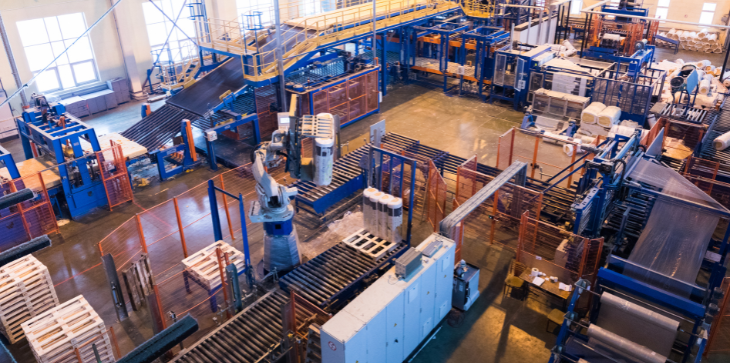Thailand has emerged as a significant hub for manufacturing in Southeast Asia, driven by robust infrastructure, strategic location, and government incentives. To maintain its competitive edge, the manufacturing sector in Thailand increasingly relies on Information Technology (IT) support. From optimizing production processes to enhancing supply chain efficiency, IT solutions play a crucial role in modernizing manufacturing operations. This article explores the role of IT support in Thailand’s manufacturing sector, highlighting key trends, challenges, and opportunities.
The Role of IT in Manufacturing
Manufacturing processes have evolved significantly with the advent of Industry 4.0 technologies. IT support acts as the backbone for implementing and maintaining these advanced systems. Key areas where IT support is indispensable include:
1. Automation and Robotics

Automation technologies and robotics are at the forefront of modern manufacturing. IT support ensures that automated systems run smoothly, integrating hardware with software to perform complex tasks. In Thailand, many factories are adopting robotic systems for assembly lines, requiring robust IT infrastructure to manage these technologies.
2. Data Analytics and Insights
Data-driven decision-making is essential for optimizing operations. IT systems collect and analyze data from various production stages, offering insights to improve efficiency, reduce waste, and enhance product quality. Thai manufacturers increasingly use predictive analytics to foresee equipment failures and schedule timely maintenance.
3. Supply Chain Management
Effective supply chain management is critical for manufacturing. IT support provides tools for inventory tracking, order management, and logistics optimization. Technologies like IoT (Internet of Things) and blockchain are being adopted in Thailand to create transparent and efficient supply chains.
4. Cybersecurity
As manufacturing becomes more digitalized, protecting sensitive data and systems from cyber threats is paramount. IT support teams implement firewalls, encryption, and monitoring systems to safeguard manufacturing operations against potential breaches.
IT Support Trends in Thailand’s Manufacturing Sector
1. Adoption of Smart Factories
Smart factories leverage IoT devices, cloud computing, and AI to automate and optimize operations. IT support is essential for deploying and managing these technologies, ensuring seamless communication between machines and systems.
2. Emphasis on Sustainability
Thai manufacturers are prioritizing sustainable practices, and IT solutions are aiding in this transition. Energy management systems, for instance, help monitor and reduce energy consumption, aligning with environmental goals.
3. 5G Connectivity
The rollout of 5G networks in Thailand is enabling faster and more reliable communication between devices. IT support teams are exploring ways to integrate 5G capabilities into manufacturing operations to enhance connectivity and productivity.
4. AI and Machine Learning
Artificial Intelligence (AI) and Machine Learning (ML) are becoming integral to manufacturing in Thailand. These technologies enable predictive maintenance, quality control, and process optimization. IT support ensures the successful implementation and operation of AI systems.
Challenges in Providing IT Support for Manufacturing
While the benefits of IT in manufacturing are evident, there are challenges specific to the Thai context:
1. Skilled Workforce Shortage
There is a growing demand for IT professionals with expertise in manufacturing technologies. However, the supply of such talent is limited, creating a gap that needs to be addressed through training and education.
2. Integration with Legacy Systems
Many manufacturing facilities in Thailand still operate with outdated systems. Integrating modern IT solutions with these legacy systems can be complex and time-consuming.
3. Cybersecurity Risks
The increasing digitization of manufacturing processes has made the sector vulnerable to cyberattacks. Ensuring robust cybersecurity measures requires continuous investment and expertise.
4. Cost of Implementation
Deploying advanced IT solutions often involves significant upfront costs. Small and medium-sized enterprises (SMEs) in Thailand may struggle to justify or afford these investments.
READ ALSO : Gamification in IT: Driving Employee Engagement and Training
Opportunities for IT Support in Thai Manufacturing
1. Government Initiatives
The Thai government’s policies, such as the Thailand 4.0 initiative, are encouraging the adoption of advanced technologies in manufacturing. These policies create opportunities for IT support providers to partner with manufacturers in implementing cutting-edge solutions.
2. Expanding Export Markets
Thailand’s position as a manufacturing hub for export markets drives the need for advanced IT systems to manage production, logistics, and compliance. IT support services can help manufacturers meet international standards and remain competitive.
3. Collaboration with Global IT Firms
Collaboration with global IT companies allows Thai manufacturers to access the latest technologies and expertise. Such partnerships can accelerate the adoption of advanced IT solutions in the sector.
4. Customized IT Solutions for SMEs
Providing cost-effective and scalable IT solutions tailored for SMEs is a significant opportunity. These solutions can enable smaller manufacturers to adopt technologies that improve efficiency and competitiveness.
Case Study: IT Support Transforming a Thai Manufacturer
Background: A mid-sized electronics manufacturer in Thailand faced challenges with production inefficiencies and frequent equipment breakdowns. The company’s existing systems were outdated, leading to delays and increased costs.
Solution: The manufacturer partnered with an IT service provider to implement a comprehensive solution:
- IoT Integration: IoT sensors were installed on production equipment to monitor performance and predict maintenance needs.
- Data Analytics: A centralized data analytics platform was deployed to analyze production data and identify bottlenecks.
- Automation: Robotic systems were introduced for repetitive tasks, reducing human error and improving consistency.
- Cybersecurity: Advanced security measures were implemented to protect the company’s digital assets.
Results: Within a year, the company reported a 25% reduction in downtime, a 15% increase in production efficiency, and significant cost savings. The success of this transformation highlighted the value of robust IT support in modern manufacturing.
The Future of IT Support in Thai Manufacturing
The future of IT support in Thailand’s manufacturing sector is promising, driven by technological advancements and growing demand for innovation. Key trends to watch include:
1. Increased Use of AI and Robotics
As AI and robotics become more accessible, their adoption in manufacturing will continue to grow. IT support will play a crucial role in deploying and maintaining these systems.
2. Focus on Workforce Upskilling
To address the skills gap, manufacturers and IT providers will need to invest in workforce training programs. Collaboration with educational institutions can also help bridge this gap.
3. Expansion of Cloud-Based Solutions
Cloud computing offers scalable and cost-effective solutions for manufacturing. IT support teams will increasingly focus on cloud integration and management.
4. Enhanced Cybersecurity Measures
With the rise of cyber threats, IT support will prioritize implementing advanced security measures to protect manufacturing operations.
IT support is a cornerstone of Thailand’s manufacturing evolution, enabling businesses to embrace digital transformation and remain competitive in a globalized market. By addressing challenges and leveraging opportunities, IT solutions can drive innovation, efficiency, and sustainability in the sector.
As Thailand continues its journey toward becoming a leader in smart manufacturing, the collaboration between IT providers and manufacturers will be instrumental in shaping the industry’s future. Investing in advanced technologies and building a skilled workforce will ensure that Thailand’s manufacturing sector remains resilient and forward-looking.





